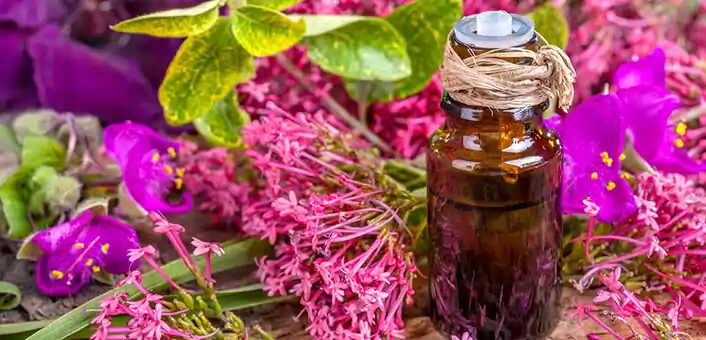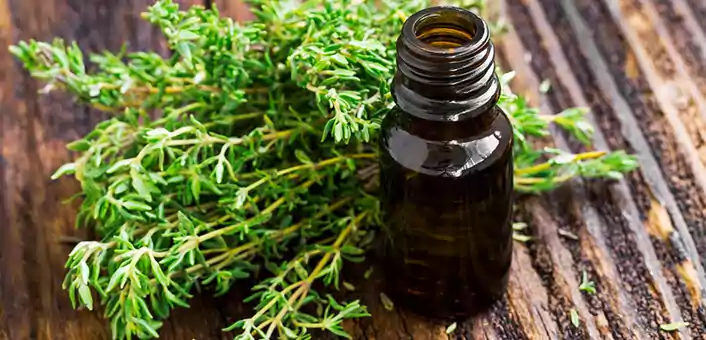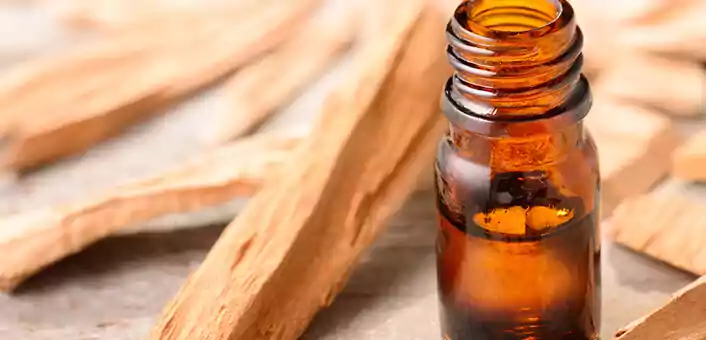
Lifestyle
8 Essential Oils For PCOS & How To Use Them
Oct 22, 2017If you have PCOS, changing your diet and lifestyle will go a long way towards reversing PCOS. But there’s one more way to naturally alleviate the many troublesome symptoms of PCOS – essential oils. And who doesn’t like the idea of aromatherapy to help you relax, unwind and heal your body at the same time! The use of essential oils for PCOS can be a powerful tool for managing this condition.
Why Essential Oils For PCOS Work?
An alternative healing practice, aromatherapy uses essential oils to improve health and well-being. You will find a variety of natural cures in the plant world, and using essential oils for PCOS are one such example. Unlike dried leaf, stem or fruit of plants (which are basically herbs), essential oils are the potent oils in the plant. These oils are extracted through a unique distillation process so that every drop becomes a potent natural medicine.
Some essential oils for PCOS boost the limbic system to help reset hormones and release built-up stress – both physical and mental. Some oils improve insulin sensitivity and others may ease other discomforting PCOS symptoms. There are essential oils that can also do wonders for acne, hirsutism, fatigue and gut problems. And unlike allopathic medicines, essential oils accomplish all this without any unwarranted side effects.
Additionally, PCOS makes women susceptible to endocrine disrupting chemicals. Sadly, these chemicals lurk in surprising places, making essential oils for PCOS all the more important for a natural skin-care, self-care and home-care routine.
So, which are the best essential oils for PCOS?
8 Top Essential Oils for PCOS
Since PCOS is characterized by a rather large list of symptoms, there are a variety of essential oils for PCOS you can use to address your specific symptoms. It’s best to consult a natural holistic practitioner to know the safe dosage of essential oils for PCOS. Not only will an expert advise you on the best essential oils for your specific PCOS symptoms, he/she will also advise you on how to blend together essential oils with carrier oils for maximum relief. Below, we list the 8 top essential oils for PCOS to get you started.
Clary Sage
Clary sage oil can help improve estrogen dominance, reduce cortisol levels and can also help with PMS cramping and mood swings. Its calming properties help with stress relief and can be particularly helpful for hormonal mood disorders. A Korean study done in 2014 found that inhaling Clary Sage oil improved thyroid hormone levels and helped reduced cortisol levels by a whopping 36% in menopausal women. Clary Sage essential oil is a uterine tonic that can also help in regulating periods. Additionally, it can also boost hair growth, fight acne and improve fertility.
Thyme
Thyme essential oil can help balance progesterone levels in the body. According to a study, it contains high phytoprogestins (or plant-based progesterone) that can help with insomnia, weight gain, mood swings and hot flashes. If you’re struggling with low levels of progesterone which is interfering with regular ovulation, thyme essential oil is the right choice for you.
Sandalwood
According to Dr. Josh Axe, sandalwood essential oil can help balance out testosterone levels in both men and women. Dr. Axe is a certified doctor of natural medicine, chiropractic and a clinical nutritionist. Sandalwood essential oil is particularly helpful for women dealing with acne, hirsutism and male pattern baldness. And its amazing fragrance makes it an excellent choice for a hormone balancing aromatherapy session. The scent will balance out your hormones and also improve your libido, as low libido can be another warning sign of PCOS.
Germanium
The scent of germanium stimulates the adrenal cortex, which helps in balancing hormones. The oil works as a natural anti-depressant and can help relieve anxiety. Studies have found that inhaling germanium essential oil can reduce anxiety by 18%. It is also touted as a natural uterine and ovarian tonic in traditional folk medicine. Germanium essential oil can promote the feeling of calm, improve fertility and can also fight against acne.
Lavender
There’s a reason lavender is one of the most popular essential oils known today! Not only does it help relieve stress and promote relaxation, it also fights anxiety and depression. Research has verified the effect of aromatherapy using lavender essential oil on the stress response in menstrual period. Rubbing a few drops of lavender essential oil can bring relief from PMS symptoms like dysmenorrhea, pain and menstrual cramps. These symptoms are all too common in PCOS. If you suffer from sleep disturbances, putting a few drops of lavender oil on your pillow can also help you stay calm and promote sound sleep.
Cinnamon
Cinnamon has the unique ability to improve insulin sensitivity, which can be particularly useful for women with PCOS who are dealing with insulin resistance. Rat studies have found that cinnamon essential oil has a regulative role in blood glucose level and lipids. Cinnamon oil can also help you lose weight because the scent positively affects satiety. And who doesn’t love the smell of cinnamon wafting through their home…almost like freshly baked cookies without ingesting the calories!
Black Cumin
If your PCOS is characterized by insulin resistance and elevated blood sugar levels, black cumin seed oil can be helpful. Nigella Sativa (Black Cumin) oil has been used for centuries in traditional medicine for treating diabetes, Alzheimer’s disease and even migraines. Studies have found that just two grams daily of Nigella black seed could result in reduced fasting blood sugar levels. It can also lead to decreased insulin resistance and increased beta-cell function in the pancreas.
Ylang Ylang
Ylang Ylang essential oil is known to be a natural antidepressant. It helps balance cortisol and adrenals to fight stress. Its exotic fragrance can balance out skin oils, and can also improve hair growth as well as fertility. A pilot study was carried out in Portugal to verify the use of Ylang Ylang essential oil in relieving anxiety. The study showed clear evidence that use of this plant led to a significant alteration in self-esteem, especially in women with hormonal disruptions.
How to Use Essential Oils for PCOS?
In general, essential oils for PCOS can be used in 3 ways.
Inhale Them
Also known as diffusion, this is a safe method wherein the essential oil doesn’t come in physical contact with your skin. You can use a vaporizer or humidifier to diffuse a few drops of the essential oil so the scent fills up the room. You can also open the bottle and directly inhale the scent. Or you can apply a few drops to your pillow so you inhale the scent all night long.
Apply On Skin
Topical application of essential oils requires care. It’s best to never apply any essential oil directly on to skin, unless told otherwise, as these are very potent and can cause interactions. It’s good to blend essential oils with carrier oil like castor oil or coconut oil. A massage with essential oils is extremely beneficial for PCOS related cramps, bloating and pain. Because massage helps in improving blood circulation to the affected area, and the oil is readily absorbed in the area.
Ingest Them
Very few essential oils can be safely ingested, which is why it’s best to work with a naturopath or a natural healthcare practitioner who is trained in aromatherapy. When essential oils for PCOS are safe for ingestion, you can add a few drops into a cup of herbal tea and sip slowly.
It’s also important to note that not all essential oils for PCOS are created equal. To find relief from PCOS symptoms, it’s imperative that you choose the highest quality essential oils that are made from pesticide-free plants. It’s best to do a bit of research or ask for professional advice to help find a good, reputable brand.
While lifestyle changes certainly help in managing the symptoms of PCOD, reversing the condition requires a holistic approach. Learn how to reverse PCOD naturally with Sepalika’s 5-Petal PCOD Programme. Our personalised protocols using a holistic approach help treat PCOD at the root through diet, nutrition, exercise, Ayurveda and magnet acutherapy. What’s more, expert consults via phone and WhatsApp help you always stay on track in your journey to overcome PCOD.
References:
1. Changes in 5-hydroxytryptamine and cortisol plasma levels in menopausal women after inhalation of clary sage oil – https://www.ncbi.nlm.nih.gov/pubmed/24802524 2. Estrogen and progestin bioactivity of foods, herbs, and spices – https://www.ncbi.nlm.nih.gov/pubmed/9492350 3. Top 3 Essential Oils to Balance Hormones Naturally – https://draxe.com/essential-oils- for- hormones/ 4. Anxiety reduction by aromatherapy: Anxiolytic effects of inhalation of geranium and rosemary – http://www.sciencedirect.com/science/article/pii/0962456295800387 5. Effects of Aromatherapy on the Stress Response of College Women with Dysmenorrhea during Menstruation – https://synapse.koreamed.org/DOIx.php?id=10.4040/jkan.2002.32.3.317 6. Antidiabetic effects of cinnamon oil in diabetic KK-A y mice – http://www.sciencedirect.com/science/article/pii/S0278691510003625 7. Effect of Nigella sativa seeds on the glycemic control of patients with type 2 diabetes mellitus – https://www.ncbi.nlm.nih.gov/pubmed/21675032 8. Relaxing effect of ylang ylang oil on humans after transdermal absorption – http://onlinelibrary.wiley.com/doi/10.1002/ptr.1950/full 9. Aromatherapy with ylang ylang for anxiety and self-esteem: a pilot study – http://www.scielo.br/scielo.php?pid=S0080-62342014000300492&script=sci_arttext












